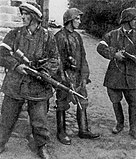| Part of a series on the |
| Polish Underground State |
|---|
 History of Poland 1939–1945 History of Poland 1939–1945 |
| Authorities |
|
Political organizations Major parties Minor parties Opposition |
|
Military organizations Home Army (AK) Mostly integrated with Armed Resistance and Home Army Partially integrated with Armed Resistance and Home Army
Non-integrated but recognizing authority of Armed Resistance and Home Army Opposition |
| Related topics |
Directorate of Civil Resistance (Polish Kierownictwo Walki Cywilnej, short KWC) was one of the branches of the Polish Government Delegate's Office during World War II. Its main tasks were to maintain the morale of the Polish society, encourage passive resistance, report German atrocities and cruelties to the Polish Government in Exile, and to organize sabotage. In addition, it was responsible for the law and justice in occupied Poland.
It organized trials of traitors, collaborators and provocateurs as well as the most cruel members of the Wehrmacht, Gestapo and SS. The verdicts varied from boycott, fines, and lash to capital punishment. The trials were carried out by civil Underground court and the verdicts were enforced by the Państwowy Korpus Bezpieczeństwa. From 1942 on, the KWC also prosecuted crimes such as theft, rape, and murder.
The KWC was headed by Stefan Korboński. In 1943 it was joined with Directorate of Covert Resistance and formed the Directorate of Underground Resistance.
See also
References
- Majewski, Piotr. "Z frontu walki cywilnej. Przyczynek do dziejów Kierownictwa Walki Cywilnej i Kierownictwa Walki Podziemnej na obszarze Generalnego Gubernatorstwa w latach 1939–1945". Kwartalnik Historyczny. 119 (4): 693–749.
This Polish history–related article is a stub. You can help Misplaced Pages by expanding it. |
This World War II article is a stub. You can help Misplaced Pages by expanding it. |